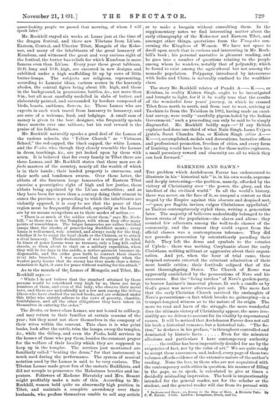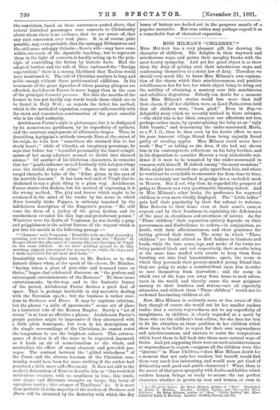DARKNESS AND DAWN.*
THE problem which Archdeacon Farrar has endeavoured to illustrate in his " historical tale " is, in his own words, supreme and deeply interesting,—the problem, namely, afforded by the victory of Christianity over " the power, the glory, and the intellect of the civilised world." In all the world's history, there was never, on the face of it, so unequal a contest as that waged by the Empire against this obscure and despised sect, —`• quos, per flagitia invisos, vulgus Christianos appellabat," as Tacitus contemptuously styled them, writing a generation later. The majority of believers undoubtedly belonged to the lowest strata of the population—the slaves and aliens : they counted few adherents among the well-to-do classes of the community, and the utmost they could expect from the official classes was a contemptuous tolerance. They did not provoke persecution by ostentatiously parading their faith. They left the drum and cymbals to the votaries of Cybele : there was nothing Corybantic about the early Christians, nothing militant or aggressive about their organi- sation. And yet, when the hour of trial came, these despised outcasts extorted the reluctant admiration of their most hostile critics ; their fortitude eclipsed that of the most thoroughgoing Stoics. The Church of Rome was apparently annihilated by the persecutions of Nero and his successors. But the " living torches " of Nero's garden-party, to borrow Latimer's immortal phrase, lit such a candle as by God's grace was never afterwards put out. The mere fact that the early Christian Church survived the onslaughts of Nero's persecutions—a fact which brooks no gainsaying—is a trumpet-tongued witness as to the nature of its origin, The more we read and learn of the struggle, the more wonderful does the ultimate victory of Christianity appear, the more irre- sistibly are we driven to account for its vitality by supernatural causes. It will be noticed that Archdeacon Farrar does not call
his book a historical romance, but a historical tale. "The fic- tion," he declares in his preface, " is throughout controlled and dominated by historic facts Even for the minutest allusions and particulars I have contemporary authority the outline has been imperatively decided for me by the exigencies of fact, not by the rules of art." We are quite ready to accept these assurances, and, indeed, every page of these two volumes affords evidence of the extensive nature of the author's reading. None the less, to those who are not acquainted with the contemporary authorities in question, his manner of filling in the gaps, so to speak, is calculated to give at times a decidedly misleading impression. The book is unquestionably intended for the general reader, not for the scholar or the student, and the general reader will rise from its perusal with
• Darkness and. Dawn; or, &.nes in the Days of Nero. A Historic Tale. By F. W. Farrar. 2 vols. London Longman, Green, and Co.
the conviction, based on these assurances quoted above, that several historical personages were converts to Christianity about whom there is no evidence, that we are aware of, that any such conversion ever took place. It is, of course, quite possible, nay, even probable, that the unhappy Britannicus and the still more unhappy Octavia—Nero's wife—may have come within the reach of the Apostolic teaching ; but to represent them in the light of converts is hardly acting np to the prin- ciple of controlling the fiction by historic facts. Had the adopted brother and the wife of Nero embraced the "foreign superstition," there is a strong likelihood that Tacitus would have mentioned it. The roll of Christian martyrs is long and noble enough without these problematical additions. In his treatment of the great Apostles of whom passing glimpses are afforded, Archdeacon Farrar is more happy than in the case of the principal dramatis persona'. For into the mouths of the former be has put hardly any words beside those which are to be found in Holy Writ ; as regards the latter, his method, which is the method of expansion, compares unfavourably with the stern and remorseless condensation of the great annalist who is his chief authority.
Archdeacon Farrar's style is picturesque, but it is disfigured by its monotonous garishness, by its superfluity of epithets, and the constant employment of alliterative tropes. Thus, in describing Agrippina's attitude towards Nero at the outset of his reign, he tells how " sometimes she strained him to her steely heart ; " while of Claudia, an imaginary personage, he says that before her " beautiful personality the tinsel compli- ments of her many admirers seemed to shrink into shamed silence." Of another of his Christian characters, he remarks that her " gentle influence moved fearlessly with halcyon wings over the turbid abyss of crime." So, in the same vein of
turgid rhetoric, he talks of the " feline gleam in the eyes of the horrible Locusta." It has been well said of Virgil that he
disdained to say a plain thing in a plain way. Archdeacon Farrar shares this disdain, but his method of expressing it is the wrong method. The pity and horror which ought to be awakened in the mind of the reader by the scene in which Nero brutally kicks Poppna, is seriously impaired by the infelicitous description of the Emperor's person : " He still wore the dress of a jockey of the green faction, and its succinctness revealed his thin legs and protuberant person." Whatever were the faults of Vespasian, he was hardly a prig, and priggishness is the salient feature of the request which is put into his mouth in the following passage :-
"' Clemens,' said Vespasian, Domitilla tells me that yesterday morning you were learning my favourite poem, the " Epode" of Horace about the pleasures of country life, and the lines of Virgil on the same subject. As we have nothing special to do this morning, suppose you repeat the poems to us, while the boys and I make a formido for our next deer-hunt.' "
Irresistibly one's thoughts turn to Mr. Barlow, or to that historic dinner when, at the epoch of the cheese, Dr. Blimber, "having taken a glass of port-wine and hemmed twice or thrice," began that celebrated discourse on " the profuse and extravagant entertainments of the Romans." To these same entertainments, by-the-way, and to the fantastic luxury of the period, Archdeacon Farrar devotes a good deal of space. That is perhaps inevitable in any narrative dealing with the Neronian epoch ; but the business is rather over- done in Darkness and Dawn. It may be captious criticism,
but the phrase " a suite of apartments " seems out of place in a historical tale of the Roman Empire. Surely a " set of rooms " is at least as effective a phrase. Archdeacon Farrar's purple patches might be impressive if they alternated with a little plain homespun ; but even in his descriptions of the simple surroundings of the Christians, he cannot resist the temptation to use the brightest colours. This extrava- gance of diction is all the more to be regretted, inasmuch as it lends an air of sensationalism to the whole, and neutralises the effect of many eloquent and powerful pas-
sages. The contrast between the "gilded wickedness" of the Court and the obscure heroism of the Christian com- munity, would have been far more striking if the author had practised a little more self-effacement. It does not add to the reader's detestation of Nero to describe him as "this wretched meticulous creature, with no manliness in him ; this tenth- rate singer and dilettante twangler on harps ; this lump of egregious vanity ; this catspaw of Tigellinus," &c. It is more than probable that the majority of the readers of Darkness and Dawn will'be attracted by the dexterity with which the dry bones of history are decked out in the gorgeous mantle of a popular narrative. But true critics may perhaps regard it as a remarkable feat of rhetorical expansion.



















































 Previous page
Previous page